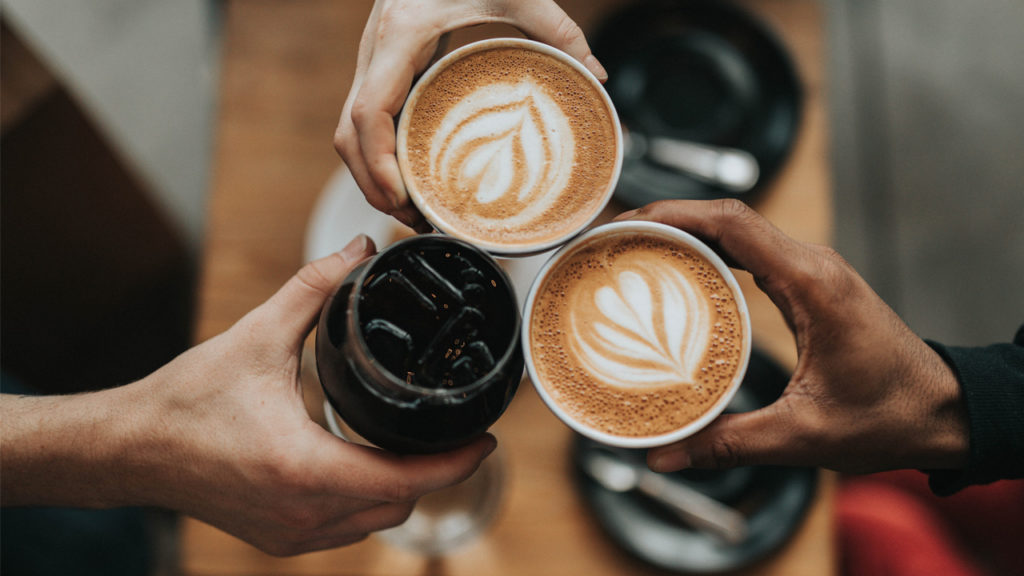If you’re interested in where your food and drink comes from, you’ll have probably heard about the impact climate change is having on coffee farming communities in climate vulnerable countries like Kenya, Brazil and Ethiopia. Inspired by their testimony, you were likely determined to do the right thing the next time you shopped for coffee. But what is the right thing to do?
You head to the supermarket, turn over the coffee packet and see words like ‘green’, ‘climate-friendly’ and ‘eco’ – the choice is overwhelming and to be frank, the language used is often confusing. What does it all mean?
At Fairtrade, we understand that brands don’t always make it easy for consumers to know how what they buy can impact both people and planet. In this blog, we break down for you in three easy steps the difference between ‘ethical’ and Fairtrade coffee and how Fairtrade and dual certified coffee is making a difference with every cup brewed.
1. What does ethically sourced coffee mean?
Unfortunately, like ‘fair trade’ (note the lower case ‘f’ and ‘t’) ‘sustainable’, ‘planet-friendly’, ‘environmentally friendly’, and others, the exact meaning of ‘ethical’ when it comes to food quality and impact on people and planet is pretty murky.
When companies refer to themselves as ‘ethical’, it’s almost impossible to tell what exact principles they follow. There are no officially recognised standards they must meet, so human rights abuses and environmental degradation may well still occur in their supply chains.
2. What is the difference between ethical and Fairtrade coffee?
Around the world, 25 million smallholders produce 70-80 percent of the world’s coffee, which is one of the reasons why Fairtrade focuses its efforts on small producer organisations. When you choose Fairtrade coffee, you know your purchase is helping to address some of the injustices of conventional trade, which traditionally discriminates against agricultural communities in low-income countries.
Here are three key things you need to know about Fairtrade:
- The Fairtrade Premium: On top of the price of the product, Fairtrade farmers and workers receive an extra sum of money called the Fairtrade Premium, which they can invest in improving their business or projects of the community’s choice – such as education, housing and protecting the local environment.
- The Minimum Price: Fairtrade farmers and workers benefit from a Minimum Price when the market price for their produce falls – and when the market price is higher than the Fairtrade Minimum Price, producers will receive the higher market price. This safety net helps farmers to secure stable, fair prices.
- Fairtrade Standards: Fairtrade sets social, economic and environmental criteria. For producers, these Standards include protection of workers’ rights, environmentally sound, climate-friendly farming practices and criteria to ensure product quality. For companies, these Standards include payments no lower than the Fairtrade Minimum Price and an additional Fairtrade Premium.
Emerging evidence through impact assessments has found that Fairtrade can make a significant difference to farmers’ and workers’ lives. What’s more, Fairtrade can provide access to finance, support and expertise in tackling climate change, supporting long-term environmental sustainability. So, when you next shop for coffee, make sure you look out for the FAIRTRADE Mark on pack. Because when you choose Fairtrade, you can guarantee you’ve made a positive contribution to the hard-working coffee farming communities all over the world who make our morning caffeine pick me up possible.
3. Why is independent certification important?
If a coffee is ‘Fairtrade’ (note the capital ‘F’) that means it has been certified by FLOCERT. FLOCERT is an independent product certification system where social, economic and environmental aspects of production are certified against Fairtrade Standards for producers and traders. Producers and buyers agree to uphold certain minimum standards and payments in return for their product to be labelled with the Fairtrade Foundation’s FAIRTRADE Mark. The Fairtrade system monitors the buying and the selling of the product until it is consumer packaged and labelled. Certificates are only issued after a physical inspection has confirmed that all relevant Fairtrade Standards have been complied with. The easiest way to spot a Fairtrade product is to look for the FAIRTRADE Mark.
50% of Fairtrade farmers also choose to go dual organic. That’s often because farmers see organic as a way to improve not just their livelihoods, but to support the environment and ensure that they and their workers are not exposed to harmful chemicals.
If a product is Fairtrade certified, you know that your purchasing decision makes a significant difference to farmers’ and workers’ lives – farmers and workers who choose to participate in Fairtrade often feel a renewed sense of autonomy over their own lives.
That’s why it’s so important to buy food that is ethically certified – especially independently certified like Fairtrade – otherwise it’s just like marking your own homework.
Hear from coffee farmers themselves about what Fairtrade means to them.
If you’re looking to try a truly ethical coffee check out a review of 12 Fairtrade speciality ones, selected by our Senior Partnership Manager, Hannah Radvan.
